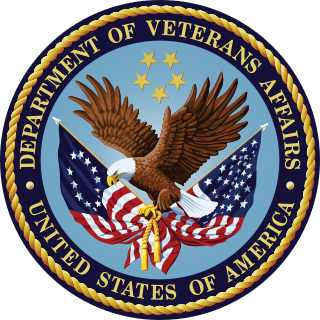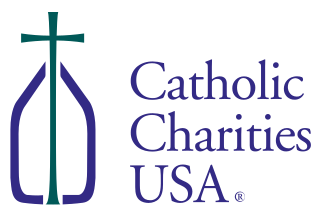
The United States Department of Veterans Affairs (VA) is a Cabinet-level executive branch department of the federal government charged with providing lifelong healthcare services to eligible military veterans at the 170 VA medical centers and outpatient clinics located throughout the country. Non-healthcare benefits include disability compensation, vocational rehabilitation, education assistance, home loans, and life insurance. The VA also provides burial and memorial benefits to eligible veterans and family members at 135 national cemeteries.

The Federal Emergency Management Agency (FEMA) is an agency of the United States Department of Homeland Security (DHS), initially created under President Jimmy Carter by Presidential Reorganization Plan No. 3 of 1978 and implemented by two Executive Orders on April 1, 1979. The agency's primary purpose is to coordinate the response to a disaster that has occurred in the United States and that overwhelms the resources of local and state authorities. The governor of the state in which the disaster occurs must declare a state of emergency and formally request from the President that FEMA and the federal government respond to the disaster. The only exception to the state's gubernatorial declaration requirement occurs when an emergency or disaster takes place on federal property or to a federal asset—for example, the 1995 bombing of the Alfred P. Murrah Federal Building in Oklahoma City, Oklahoma, or the Space Shuttle Columbia in the 2003 return-flight disaster.

The International Rescue Committee (IRC) is a global humanitarian aid, relief, and development nongovernmental organization. Founded in 1933 as the International Relief Association, at the request of Albert Einstein, and changing its name in 1942 after amalgamating with the similar Emergency Rescue Committee, the IRC provides emergency aid and long-term assistance to refugees and those displaced by war, persecution, or natural disaster. The IRC is currently working in about 40 countries and 26 U.S. cities where it resettles refugees and helps them become self-sufficient. It focuses mainly on health, education, economic wellbeing, power, and safety.

Homelessness in Canada was not a social problem until the 1980s. The Canadian government housing policies and programs in place throughout the 1970s were based on a concept of shelter as a basic need or requirement for survival and of the obligation of government and society to provide adequate housing for everyone. Public policies shifted away from rehousing in the 1980s in wealthy Western countries like Canada, which led to a de-housing of households that had previously been housed. By 1987, when the United Nations established the International Year of Shelter for the Homeless (IYSH), homelessness had become a serious social problem in Canada. The report of the major 1987 IYSH conference held in Ottawa said that housing was not a high priority for government, and this was a significant contributor to the homelessness problem. While there was a demand for adequate and affordable housing for low income Canadian families, government funding was not available. In the 1980s a "wider segment of the population" began to experience homelessness for the first time – evident through their use of emergency shelters and soup kitchens. Shelters began to experience overcrowding, and demand for services for the homeless was constantly increasing. A series of cuts were made to national housing programs by the federal government through the mid-1980s and in the 1990s. While Canada's economy was robust, the cuts continued and in some cases accelerated in the 1990s, including cuts to the 1973 national affordable housing program. The government solution for homelessness was to create more homeless shelters and to increase emergency services. In the larger metropolitan areas like Toronto the use of homeless shelters increased by 75% from 1988 to 1998. Urban centres such as Montreal, Laval, Vancouver, Edmonton, and Calgary all experienced increasing homelessness.

In the United States, the number of homeless people on a given night in January 2022 was 582,462 according to the Department of Housing and Urban Development. Annual federal HUD reports contradict private state and local reports where homelessness is shown to have increased each year since 2014 across several major American cities, with 40 percent increases noted in 2017 and in 2019.

In the United States, a National Heritage Area (NHA) is a site designated by Act of Congress, intended to encourage historic preservation of the area and an appreciation of the history and heritage of the site. There are currently 62 NHAs, some of which use variations of the title, such as National Heritage Corridor.

The McKinney–Vento Homeless Assistance Act of 1987 is a United States federal law that provides federal money for homeless shelter programs. It was the first significant federal legislative response to homelessness, and was passed by the 100th United States Congress and signed into law by President Ronald Reagan on July 22, 1987. The act has been reauthorized several times over the years.

Catholic Charities USA is the national voluntary membership organization for Catholic Charities agencies throughout the United States and its territories. Catholic Charities USA is a member of Caritas Internationalis, an international federation of Catholic social service organizations. Catholic Charities USA is the national office of 167 local Catholic Charities agencies nationwide.
Housing First is a policy that offers unconditional, permanent housing as quickly as possible to homeless people, and other supportive services afterward. It was first discussed in the 1990s, and in the following decades became government policy in certain locations within the Western world. There is a substantial base of evidence showing that Housing First is both an effective solution to homelessness and a form of cost savings, as it also reduces the use of public services like hospitals, jails, and emergency shelters. Cities like Helsinki and Vienna in Europe have seen dramatic reductions in homelessness due to the adaptation of Housing First policies, as have the North American cities Columbus, Ohio, Salt Lake City, Utah, and Medicine Hat, Alberta.

The Entertainment Community Fund, formerly The Actors Fund, is a 501(c)(3) charitable organization that supports performers and behind-the-scenes workers in performing arts and entertainment, helping more than 17,000 people directly each year. Serving professionals in film, theatre, television, music, opera, radio and dance, the Fund's programs include social services and emergency financial assistance, healthcare and insurance counseling, supportive and affordable housing, and employment and training services. The Fund owns and operates the Lillian Booth Actors Home, a skilled nursing and assisted living facility in Englewood, New Jersey.
The International Fellowship of Christians and Jews is a philanthropic organization founded in 1983 by Yechiel Eckstein whose stated mission is to promote understanding and cooperation between Jews and Christians, and provide humanitarian aid for the State of Israel. Since 2019, Yael Eckstein has been serving as The Fellowship's President and CEO.

Iraq and Afghanistan Veterans of America (IAVA), is a nonprofit 501(c)(3) veterans organization founded by Paul Rieckhoff, an American writer, social entrepreneur, advocate, activist and veteran of the United States Army and the Iraq War. He served as an Army First Lieutenant and infantry rifle platoon leader in Iraq from 2003 through 2004. Rieckhoff was released from the Army National Guard in 2007.
Pathways to Housing is a not-for-profit organization founded in 1992 by Dr. Sam Tsemberis. It is the mission of Pathways to Housing to transform individual lives by ending homelessness and supporting recovery.

The United States Interagency Council on Homelessness (USICH) is an independent federal agency within the U.S. executive branch that leads the implementation of the federal strategic plan to prevent and end homelessness. USICH is advised by a Council, which includes the heads of its 20 federal member agencies.
The Helping Families Save Their Homes Act of 2009 is an enacted public law in the United States. On May 20, 2009, the Senate bill was signed into law by President Barack Obama. The stated purpose of the act, a product of the 111th United States Congress, was to allow bankruptcy judges to modify mortgages on primary residences, among other purposes; however, that provision was dropped in the Senate and is not included in the version that was eventually signed into law. In addition, the bill amends the Hope for Homeowners Program as well as provide additional provisions to help borrowers avoid foreclosure.
ACT Alliance is a global alliance of more than 145 churches and related organisations from over 120 countries created to provide humanitarian aid for poor and marginalized people. 76% of its member organisations are rooted on the global south, 22% in the global north and 2% have a global presence.

Safe Horizon, formerly the Victim Services Agency, is the largest victim services nonprofit organization in the United States, providing social services for victims of abuse and violent crime. Operating at 57 locations throughout the five boroughs of New York City. Safe Horizon provides social services to over 250,000 victims of violent crime and abuse and their families per year. It has over 800 employees, and has programs for victims of domestic violence, child abuse, sexual assault, and human trafficking, as well as homeless youth and the families of homicide victims. Safe Horizon's website has been accessible for the Spanish-speaking population since 2012. Safe Horizon has an annual budget of over $63 million.
Family Promise is a national 501(c)(3) nonprofit organization in the United States, founded by Karen Olson in 1988. Family Promise primarily serves families with children who are homeless or at risk of homelessness, with the mission of "help[ing] homeless and low-income families achieve sustainable independence through a community-based response."

Philip F. Mangano is the President and CEO of The American Round Table to Abolish Homelessness, and former Executive Director of the White House United States Interagency Council on Homelessness.














